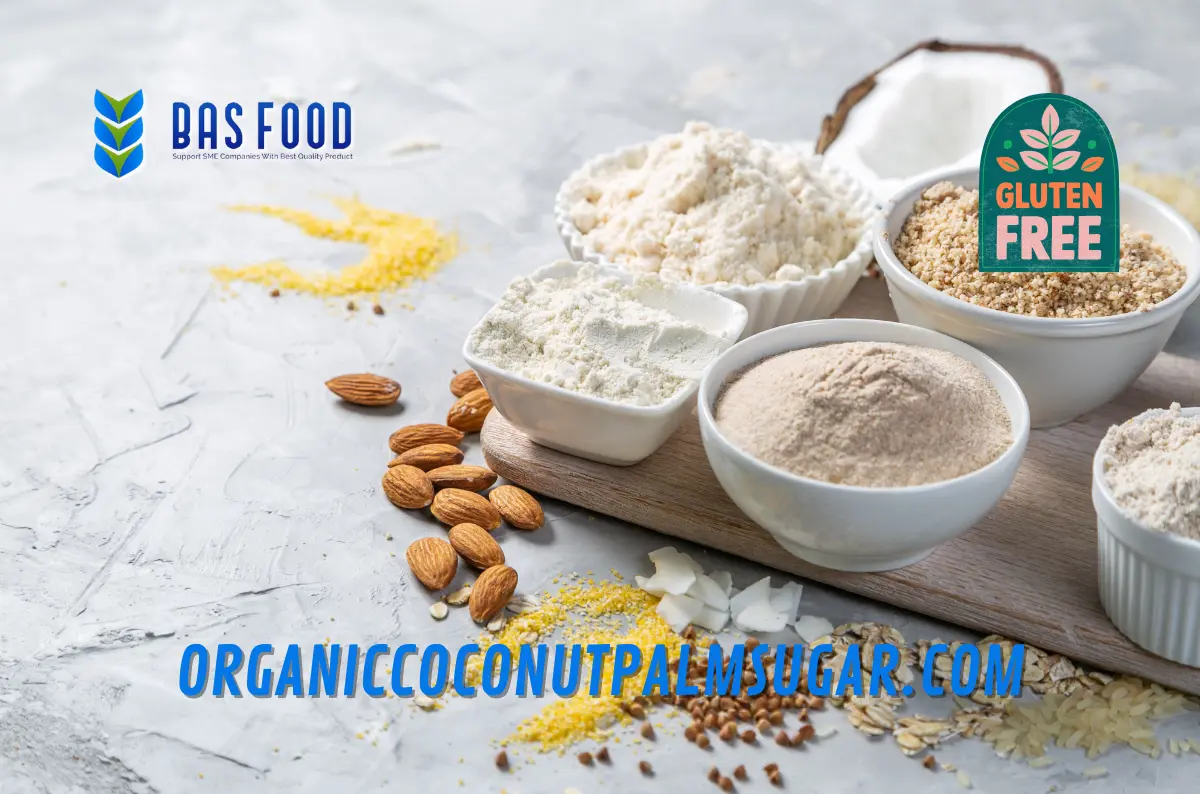The food industry is changing faster than ever. Consumers are reading labels, questioning ingredients, and choosing cleaner, plant-based options. In this movement, coconut flour vegan gluten-free products have taken center stage. This tropical flour has become a favorite among bakers, food brands, and nutrition enthusiasts who want healthier alternatives without compromising taste or texture.
Coconut flour isn’t just another fad ingredient—it’s a revolution in clean eating. With its high fiber, low carb, and naturally sweet profile, it checks all the boxes for vegan, gluten-free, and health-conscious consumers. From cookies to pancakes, this humble flour has redefined how plant-based and gluten-free foods are made.

What Makes Coconut Flour a Vegan and Gluten-Free Star
At its core, coconut flour is made from pure, dried coconut meat that’s been finely ground after the oil extraction process. This means it contains no animal products, no gluten, and no artificial additives—making it a naturally clean label ingredient ideal for modern food production.
In plant-based baking, one of the biggest challenges is replacing wheat flour while maintaining texture and taste. Coconut flour steps in as a versatile solution. Its mild coconut flavor enhances baked goods, and its natural sweetness allows bakers to reduce sugar content. Plus, because it’s dense and absorbent, it only takes a small amount to make a big difference in recipes.
For vegan brands, coconut flour offers a unique functional advantage. When combined with flaxseed, chia, or aquafaba, it produces doughs and batters that mimic traditional baked textures—without the need for eggs or dairy. This makes it the perfect base for plant-based baking.
The Health Edge: Nutrition That Speaks for Itself
Coconut flour’s popularity isn’t just about dietary restrictions—it’s about health benefits that appeal to everyone. It’s rich in dietary fiber, which supports digestion and promotes satiety. Its medium-chain triglycerides (MCTs) help boost metabolism and provide long-lasting energy.
Compared to other gluten-free flours like rice or tapioca, coconut flour is significantly higher in protein and lower in carbs. It’s also naturally grain-free, making it suitable for paleo, keto, and diabetic-friendly diets. For brands looking to create multipurpose health foods, coconut flour vegan gluten-free recipes deliver nutritional balance that fits almost every wellness trend.
The best part? Coconut flour doesn’t require chemical processing. It’s simply dried, defatted, and milled coconut meat—making it a true organic flour substitute that aligns with consumer demand for minimal-ingredient foods.
Coconut Flour in Plant-Based Baking: A Game Changer
Baking without gluten or animal products often comes with trade-offs. Many alternative flours can make baked goods crumbly, flavorless, or dry. Coconut flour, however, helps overcome these challenges. Its natural fat content gives moisture, while its fiber adds structure and volume.
When used properly, coconut flour produces soft, flavorful, and satisfying baked goods. It’s perfect for vegan brownies, gluten-free cookies, and high-protein pancakes. Because it absorbs more liquid than regular flour, most recipes use less coconut flour—usually about one-fourth the amount of wheat flour—making it both efficient and cost-effective.
For cafés and bakeries focused on plant-based baking, this ingredient is a must-have. It allows chefs to create indulgent treats that still fit into vegan and gluten-free menus. And because it’s naturally aromatic, it enhances the sensory appeal of desserts and pastries without added flavorings.
Clean Label Ingredient: Why Transparency Matters
Today’s consumers are more informed than ever. They want products that are natural, sustainable, and easy to understand. This has made the clean label ingredient movement a defining force in the food industry. Coconut flour perfectly embodies this trend—it’s single-ingredient, minimally processed, and naturally nutritious.
Brands that highlight coconut flour as part of their formulation instantly gain credibility among health-conscious buyers. It communicates simplicity, purity, and transparency. No synthetic additives. No preservatives. Just 100% coconut.
Moreover, coconut flour production supports sustainability. It’s made from coconut byproducts that would otherwise go to waste after oil or milk extraction. This zero-waste approach gives it an eco-friendly appeal, which is increasingly important for global food brands and ethical consumers alike.
Why Food Brands Choose Coconut Flour for Product Innovation
As vegan and gluten-free products move into the mainstream, brands are constantly searching for ingredients that offer functionality and appeal. Coconut flour meets both needs. Its light texture and natural sweetness make it ideal for snacks, baking mixes, smoothies, and protein bars.
Food manufacturers also value its stability and long shelf life. When stored properly, coconut flour can last up to 18 months—making it a reliable ingredient for large-scale production. It blends well with other flours such as almond, oat, or cassava, allowing product developers to fine-tune texture and flavor profiles.
In addition, the rise of organic flour substitute products in global markets has made coconut flour a top choice for B2B buyers. Its “clean” reputation boosts product marketing, especially in regions like the EU and USA, where consumer awareness around natural ingredients continues to grow.
Introducing CV Bonafide Anugerah Sentosa: Your Trusted Coconut Supplier
For businesses looking to source high-quality coconut ingredients, CV Bonafide Anugerah Sentosa stands out as a reliable partner. Based in Kulon Progo, Yogyakarta, Indonesia, the company specializes in exporting coconut derivatives, including coconut flour, coconut sugar, coconut water concentrate, and desiccated coconut.
As a trusted coconut supplier and spices supplier, CV Bonafide Anugerah Sentosa ensures every product meets international quality standards. Their production processes follow sustainable and ethical sourcing practices, supporting local coconut farmers and minimizing waste.
By working with a dependable supplier like CV Bonafide Anugerah Sentosa, vegan and gluten-free food brands can ensure consistent quality and supply, backed by certifications and professional documentation. The company’s commitment to excellence makes it a preferred exporter for importers seeking premium coconut-based ingredients.
The Future of Coconut Flour in Vegan and Gluten-Free Markets
The global shift toward conscious eating is not slowing down. Analysts predict continued growth in the vegan and gluten-free product sector, driven by consumers who care about both health and sustainability. In this space, coconut flour is likely to remain a foundational ingredient.
Future innovations may include pre-mixed coconut flour blends for specific applications—like ready-to-use vegan pancake mixes or gluten-free bakery kits. As research into coconut byproducts expands, we may also see new textures and flavor enhancements derived naturally from coconuts themselves.
For businesses, investing in coconut flour vegan gluten-free product lines now means being ahead of the curve. Whether you’re developing new snacks, desserts, or packaged mixes, coconut flour positions your brand as part of a forward-thinking, health-driven market.
Practical Tips for Using Coconut Flour in Recipe Development
Working with coconut flour requires understanding its unique characteristics. Here are some useful tips for food developers and bakers:
- Use more liquid. Coconut flour absorbs a lot of moisture, so recipes need extra water, milk, or oil to balance texture.
- Add binders. Because it lacks gluten, pair it with plant-based binders like flaxseed, chia gel, or psyllium husk for better structure.
- Blend with other flours. Combining coconut flour with almond, rice, or oat flour helps achieve desired consistency.
- Experiment with ratios. Start small—usually one part coconut flour for every four parts wheat flour—and adjust based on results.
Following these steps helps ensure consistent, high-quality products in both artisanal and industrial applications.
Sustainability: Coconut Flour’s Green Advantage
Sustainability isn’t just a buzzword; it’s a business priority. Coconut trees are one of the most eco-efficient crops on the planet. They require less water than most grain crops and produce multiple usable parts—from fruit to husk.
Coconut flour production supports circular agriculture by transforming leftover coconut pulp into valuable food ingredients. This makes it an environmentally responsible choice for brands committed to sustainable sourcing. Suppliers like CV Bonafide Anugerah Sentosa strengthen this impact by working directly with farmers and implementing eco-friendly production methods.
As environmental awareness grows, sustainable ingredients like coconut flour will continue to gain favor with consumers and regulators alike.
Final Thoughts: The Coconut Flour Revolution
The rise of coconut flour vegan gluten-free products marks a turning point in modern food innovation. It’s more than just an alternative—it’s a symbol of how the industry is evolving toward cleaner, more inclusive, and more sustainable ingredients.
For food brands, adopting coconut flour means embracing the future of healthy eating. For consumers, it represents a delicious bridge between indulgence and wellness. And for suppliers like CV Bonafide Anugerah Sentosa, it’s an opportunity to share Indonesia’s natural bounty with the world—one bag of coconut flour at a time.
Whether you’re a baker, brand owner, or importer, the message is clear: coconut flour isn’t just good for vegan and gluten-free diets—it’s good for business, people, and the planet.
Contact CV Bonafide Anugerah Sentosa how we can provide the best solutions for you. WhatsApp: +62 8213 4505 737, Email: info@bonafideanugerahsentosa.com / bas.mdir@gmail.com.

